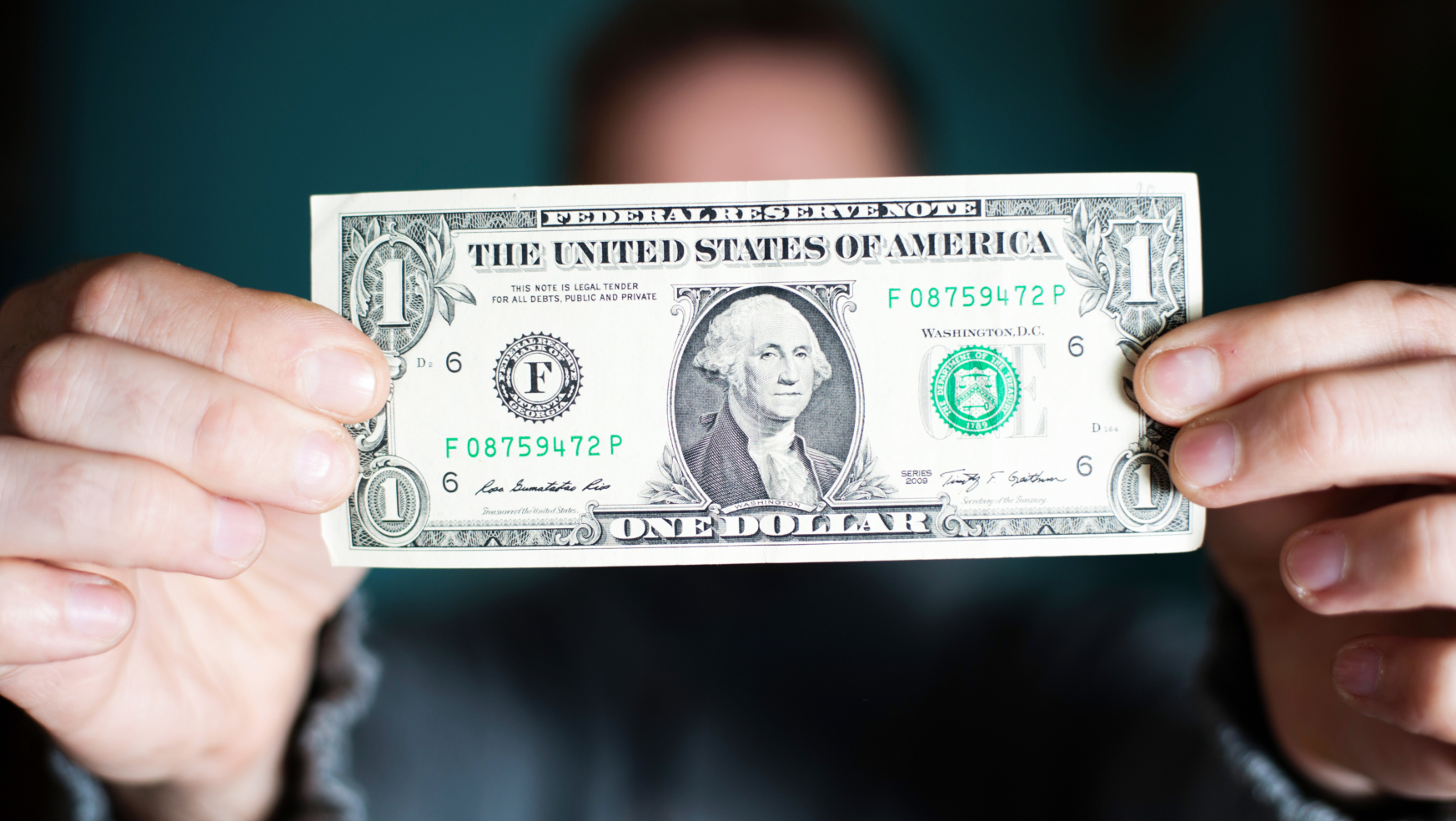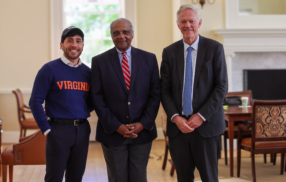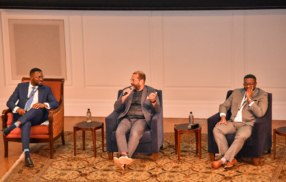
Is ‘King Dollar’ in Danger of Losing Its Crown?
By Lauren Foster
The U.S. dollar has reigned as the currency of choice in global trade and finance since at least the 1950s, with its dominant position rarely facing a serious challenge. Until now.
Last week, confidence in the world’s reserve currency was badly shaken after turbulence in U.S. stock and bond markets coincided with a sharp decline of the greenback against other developed economy currencies. The volatility prompted economists and investors alike to reconsider long-held assumptions about dollar dominance.
The recent market turbulence raises a critical question. As we witness the dollar’s decline against other major currencies — down nearly 4% since Trump’s tariff announcement and over 9% from its January high — we must confront a possibility that was once unthinkable:
Are the dollar’s days as the king of the currency universe coming to an end? And if so, what might replace it?

Frank Warnock is a Darden professor and a senior research advisor at the Federal Reserve Board.
Expert Perspectives on Dollar Dominance
These questions were explored in depth at the University of Virginia Darden School of Business this week when currency strategist Marc Chandler of Bannockburn Capital Markets joined Professor Frank Warnock‘s Global Financial Markets class. Warnock is the James C. Wheat Jr. Professor of Business Administration and a senior research advisor at the Federal Reserve Board.
Their timely new case — “The World’s Next Reserve Currency” — examines potential successors to the dollar, from traditional alternatives like gold and the euro to emerging contenders such as the Chinese yuan and cryptocurrency.
In a lively exchange, Chandler discussed the future of global reserve currencies, addressing several critical issues that could reshape the international monetary system in the coming years. What follows are edited excerpts of the conversation.
Can the U.S. dollar weather the next four years of turbulence under the Trump Administration?
The short answer: It depends.
“There’s an element of trust that’s involved,” said Chandler. “If you think of it from a European point of view right now, if you base investment decisions — political, strategic decisions — on the idea of a strong North Atlantic Alliance, also known as NATO, and now the U.S. has elected not once, but twice, a leader who wants to break that alliance, can you ever regain that trust?” It’s a bit like a roommate who squeezed the toothpaste out of the tube, he added. “It’s all over the sink and it can’t go back in the tube. Once the trust is violated, how easy is it to put back in?”
What triggered last week’s unusual bond market sell-off?
It’s worth taking a detour to briefly recap what happened last week and why it was so unusual.
Last week, the yield on the closely watched 10-year Treasury bond increased to about 4.5% from just below 4% At the same time, the dollar fell, even though Trump’s tariffs were initially expected to boost the greenback.
Chandler questioned the popular narrative that the sharp selloff in U.S. government bonds, which drove up yields, was a sign that international investors were fleeing American assets.
He reminded that there is no hard data indicating that, because capital flows data are reported with a long lag. Instead, he pointed to other possible factors, including something called the basis trade.
The basis trade is when hedge funds and other financial players sell holdings from a complex transaction that tries to profit from the difference in price between a Treasury bond and a Treasury futures contract with similar characteristics. When these traders unwind their positions, it can create significant market pressure without necessarily signaling a loss of confidence in U.S. assets.
Could the U.S. government intentionally withhold debt payments?
Moving from market mechanics to policy considerations, Chandler acknowledged that it was scary to talk about the possibility that the U.S. would be unable to meet its obligations (in other words, pay) but that the government might be unwilling to pay.
And it’s not as far-fetched as it might seem. Stephen Miran, Trump’s chair of the Council of Economic Advisers, wrote a paper last year, “A User’s Guide to Restructuring the Global Trading System,” where he floated withholding a portion of interest payments.
“Reserve holders impose a burden on the American export sector, and withholding a portion of interest payments can help recoup some of that cost,” he said. “Some bondholders may accuse the United States of defaulting on its debt, but the reality is that most governments tax interest income, and the U.S. already taxes domestic holders of UST securities on their interest payments. While this policy works through currencies as a means of affecting economic conditions, it is actually a policy targeting reserve accumulation and not a formal currency policy.”
What role, if any, will digital currencies play in reshaping the landscape?
With traditional currency dynamics under pressure, many wonder if digital alternatives might fill the void. Chandler was skeptical of crypto’s role, asking whether digital currencies, such as bitcoin, really meet the definition of money in the way that economists think of money.
Economists define money as a store of value, a medium of exchange and a unit of account, and agree that bitcoin does not currently meet all these criteria.
(Satoshi Nakamoto, the pseudonymous programmer, created bitcoin to be a form of money, but disappeared in 2010 and hasn’t been heard from since.)
The best way to think about crypto’s role, Chandler told the students, is to compare it with trees.
“What crypto does for savings, is what trees do for carbon,” he explained. “They’re a carbon sink. If that carbon didn’t get into the wood, it would be in the air, which means affecting our lungs, the atmosphere, global warming and all the effects that follow from that. Similarly, if crypto wasn’t absorbing savings, where would the money go? It would be chasing stocks to more ridiculous levels, chasing home prices even further beyond this generation’s ability to buy a home.”
Warnock noted that that was the most positive and constructive story about crypto that he’s heard.
What are the long-term determinants of exchange rates?
Looking beyond immediate market fluctuations, Chandler emphasized fundamental economic factors that drive currency values over time.
He said that over say five to 10 years, he favors gross domestic product (GDP) per capita and also looking broadly at the business cycle. In the medium term, six to 12 months, it is the monetary cycle and what the Fed is doing versus the other central banks.
Is there potential for a U.S. debt default?
When asked about the possibility of the U.S. failing to meet its debt obligations, Chandler was reassuring.
“U.S. debt is all in U.S. dollars, and even though our printing press might not have been made in the U.S., we can print off dollars as good as anybody can,” Chandler quipped.
He said the key distinction he would draw is between the government’s ability to pay the debt, which it has, and its willingness to pay the debt.
“I see no sign that the U.S. has stopped being willing to service its debt,” he said. “I think that some people are afraid that it might now, but I can accept the idea that trees don’t grow to the sky, and that the level of debt that the U.S. holds is not sustainable. But am I worried about it? Not really, partly because I don’t see that global investors are really worried about it.”
What’s the biggest worry for the U.S. economy in the near term?
Looking ahead, Chandler identified two primary concerns.
The first is that the U.S. could, as soon as next week, start withdrawing funding from some of the international agencies it helped create. The 2025 Spring Meetings of the World Bank Group (WBG) and the International Monetary Fund (IMF), take place from Monday, April 21, to Saturday, April 26.
Over the longer term, Chandler is concerned about America’s reputation in the eyes of the world. He drew an analogy to Coca-Cola’s introduction of “New Coke” in 1985, which was a new formula for the iconic soft drink.
“It was a marketing disaster,” he said. “I think that’s what the U.S. is doing now. And even if we get the opportunity, say in 2028, or beginning in mid-term elections, to say ‘oh, we made a mistake,’ and we try to go back to a more inclusive form of globalization, I don’t think other countries can trust us. And that’s the hardest thing to rebuild.”
Is King Dollar in danger of losing its crown?
After examining all these challenges and potential threats, we return to our original question: Could the dollar’s reign be ending?
The answer may be contained in a 2021 article Chandler penned for Barron’s. Despite recent volatility, his assessment remains relevant.
“For all of its flaws, the greenback remains the most important invoicing and vehicle currency,” he wrote. “Supply chains are often dollar-funded … The dollar knows no rival. There is simply no compelling alternative.”
Whether this assessment holds true amid today’s evolving geopolitical and economic landscape remains to be seen, but Chandler’s analysis suggests that reports of the dollar’s demise may be premature.
The University of Virginia Darden School of Business prepares responsible global leaders through unparalleled transformational learning experiences. Darden’s graduate degree programs (MBA, MSBA and Ph.D.) and Executive Education & Lifelong Learning programs offered by the Darden School Foundation set the stage for a lifetime of career advancement and impact. Darden’s top-ranked faculty, renowned for teaching excellence, inspires and shapes modern business leadership worldwide through research, thought leadership and business publishing. Darden has Grounds in Charlottesville, Virginia, and the Washington, D.C., area and a global community that includes 18,000 alumni in 90 countries. Darden was established in 1955 at the University of Virginia, a top public university founded by Thomas Jefferson in 1819 in Charlottesville, Virginia.
Press Contact
Molly Mitchell
Senior Associate Director, Editorial and Media Relations
Darden School of Business
University of Virginia
MitchellM@darden.virginia.edu




